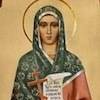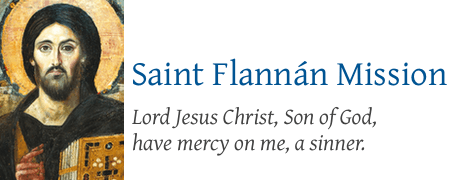 In the Name of the Father and of the Son and of the Holy Spirit, one God. Amen. Dear beloved, let us remember the martyr Saint Euphemia the All-Praised from Chalcedon, may the holy saint pray for us!
In the Name of the Father and of the Son and of the Holy Spirit, one God. Amen. Dear beloved, let us remember the martyr Saint Euphemia the All-Praised from Chalcedon, may the holy saint pray for us!
In the Church, we venerate saints and their relics, and while some may mistakenly believe we pray to the saints as if they are God, we do not.
We venerate them as our elder brothers and sisters who are of His Kingdom, we venerate them as reminders to our own worldly struggles and journeys, we venerate their relics as we remember their service to God as we also remind ourselves of our worldly mortality and our urgency to attend to journey to God.
They are, in life and after this worldly life, what we reflect on in Luke 23:43 when Christ our Lord told the thief who confessed and professed, “Truly I say to you, today you shall be with me in Paradise”.
We too, by our confession of our sins always, and professing His Holy Name, seek the same fruits of God’s Grace. The saints were soldiers of faith, trusting our Lord in all the days of their lives, in all the ways of their lives (Proverbs 3:5-8). They resolutely and steadfastly repented, kept the commandments of God, gave their love to many, and withstood the persecution and even death that came with their profession of Christ as Lord.
The saints departed, and we who are of the world and struggling towards God, form the Church. We are the Church militant, or the visible Church, and the saints are the Church triumphant, or the invisible Church. We long for, and hope for God’s mercy to shower us one day too, to join our beloved saints in His Kingdom – that is what we seek for in life.
Holy father among the saints, St John of Damascus (Damascene) said (The Precious Pearl: The lives of Saints Barlaam and Joseph),
“We carry about these clean and holy bones, O king, because we attest in due form our love of those marvelous men to whom they belong: and because we would bring ourselves to remember their wrestlings and lovely conversation, to rouse up ourselves to the like zeal; and because we would catch some vision of the rest and felicity wherein they now live, and thus, as we call them blessed, and provoke one another to emulate them, strive to follow their footsteps: because, moreover, we find thereby that the thought of death, which is right profitable, lends wings of zeal to our religious exercises; and lastly, because we derive sanctification from their touch.”
God gifts us with His mercy, grace and love through many means. And sometimes, the holy relics of departed saints are another means of God’s grace and mercy to us.
The prophet and wonderworker Elisha, who came after prophet Elijah was taken up by God, was an example of what St John of Damascus taught. We read from 2 Kings 13:21, when a corpse was thrown into the tomb of the prophet Elisha and touched the bones of the prophet, the dead man was revived and stood up on his feet.
Today, we commemorate the wonderworking of Saint Euphemia during the Council of Chalcedon (the Fourth Ecumenical Council) in 451 AD, where the Holy Spirit, through the holy relics of St Euphemia, showed the Council what Orthodoxy is, concerning the nature of Christ our Lord.
During the Council, the hierarchs were debating on the two natures of Christ. It was a heated and polarized debate. Patriarch Anatolios of Constantinople proposed to the Council that the decision be from the Holy Spirit, through the holy relics of St Euphemia the All-Praised. Each of the hierarchs wrote their confessions of faith on individual scrolls, and sealed them with their seals. All the scrolls were then placed on the chest of the relics of St Euphemia, and sealed the tomb back again under the eyes and imperial seal of emperor Marcian. The tomb was guarded for 3 days while the hierarchs prayed and fasted. After the 3 days, the tomb was opened before the Council and the emperor, and the scrolls with the Orthodox confessions of the two natures of Christ were in the right hand of the relics of the saint, while the scrolls with heretical confessions were at the feet of the relics.
Whenever we venerate an icon of a saint, let it be our reminder of the saint’s struggles, his repentance, his fasts, his prayers, and ask for the saint’s prayers for us too. For the saint is as near as a prayer may be. Let us keep our Lord’s Holy Name close to our hearts in repentance and prayer, so that we may too, like the thief who confessed and professed, can be with our Lord in Paradise. “Lord Jesus Christ, Son of God, have mercy on me, a sinner.”
Let us close by praying the thanksgiving prayer:
It is truly meet to call thee blest, the Theotokos, ever blessed and most pure, and the Mother of our God. More honorable than the Cherubim, and more glorious than the Seraphim, without corruption thou gavest birth to God the Word: True Theotokos, we magnify thee.
O virgin Theotokos, rejoice; O Mary full of grace, the Lord is with thee. Blessed art thou among women, and blessed is the fruit of thy womb, for thou hast borne the Savior of our souls, Jesus Christ our Lord. Amen.
Fr Raphael+
Readings
2 Kings 13:21
Proverbs 3:5-8
St Matthew 15:12-21
2 Corinthians 6:1-10

